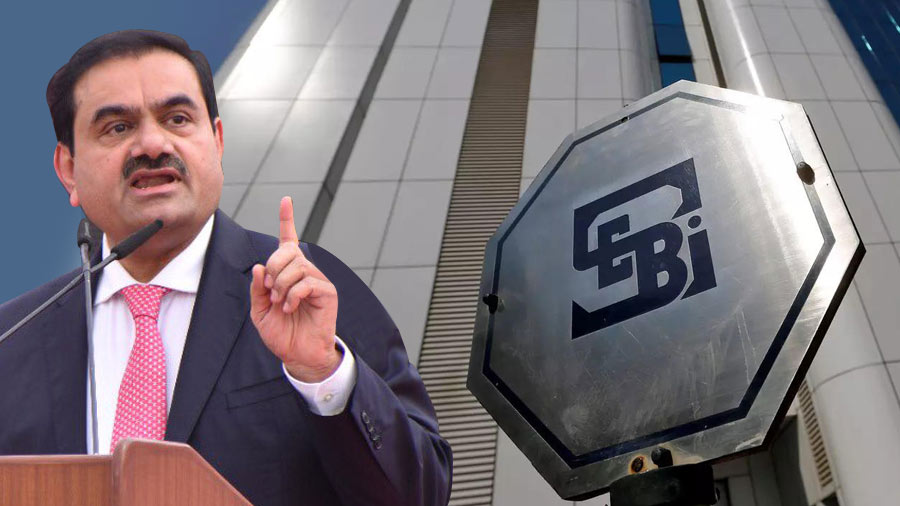Deloitte Quits As Adani Ports Auditor; SEBI To Submit Report To SC- Will Report Be Competent Enough To Gauge The Loopholes Of Indian Corporate Laws Or Adani’s Magical Combination Of Incumbency And Embedded Network Of Business Relationships Will Mark The Their Victory?
Deloitte appointed the auditor of APSEZ in 2017 and, given a new five-year contract in July 2022, had communicated tensions about several of the transactions noted in the Hindenburg Research study in May. Hindenburg also voiced concerns about incomplete reporting of related party transactions in its report from January 24 that accused the Adani Group of fraud, stock manipulation, and money laundering. Because of their assessment and the existing SEBI probe, Adani Group did not believe having an independent outside probe into these claims was necessary. The conclusions of a nearly 3-year probe into Gautam Adani's conglomerate by India's capital markets watchdog are finally anticipated to reach the country's Supreme Court this week. Several experts believe the Adani Group will receive few if any, red flags after an expert panel established by India's highest court in May stated that the SEBI had "drawn a blank" in its probe of 13 overseas organisations suspected to be fronts for Adani enterprises. "Despite all of the post-Hindenburg hullabaloo, Adani will be right there at the front of the pack."

If you are a well-read scholar in the stock market, the Adani-Hindenburg saga is no new topic to you. This pre-independence weekend witnessed another not-so-good event in the Hindenburg-Adani saga. Deloitte announced its departure from APSEZ’s auditor in a letter dated August 12 and stated that it was doing so immediately “because they are not statutory auditors of a substantial number of other Adani Group of companies.” It continued by saying that it has provided a qualified opinion in the audit of the financial statements for the quarters ended in March 2023 and June 2023.
Deloitte stated that Adani Ports declined to conduct an independent external assessment to ease the auditor’s tensions; hence, the firm gave a qualified opinion on its fiscal 2023 results. A qualified opinion means an audit report that is not clean.
Deloitte demanded an independent external probe of allegations made by a US short-seller before resigning from the post of auditor of an Adani Group company. Still, the Adani firm claimed that the accusations had no impact on financial statements and that the justifications for the resignation were insufficient to support such a move. Adani Ports and Special Economic Zone (APSEZ) stated in a 163-page filing with stock exchanges revolving around the departure of Deloitte Haskins & Sells LLP that Deloitte expressed tensions about the lack of a more extensive audit role as auditors of other listed Adani firms in meetings with its leadership.
What red flags were noticed by Deloitte when they were auditors of Adani’s APSEZ?
- Deloitte appointed the auditor of APSEZ in 2017 and, given a new five-year contract in July 2022, had communicated tensions about several of the transactions noted in the Hindenburg Research study in May. Recovery payments from a contractor mentioned in the Hindenburg report were among them.
- Hindenburg also voiced concerns about incomplete reporting of related party transactions in its report from January 24 that accused the Adani Group of fraud, stock manipulation, and money laundering.
Deloitte asked the company to initiate an independent external probe on the Hindenburg claims to see if they would impact the Adani company’s standalone financial accounts. According to Deloitte, the company’s evaluation was insufficient to meet the audit’s needs as adequate audit evidence. The auditor stated that it is unable to comment on whether the company was fully compliant with the law and whether the transactions flagged may lead to potential adjustments and/or disclosures in the financial statement concerning related parties in the absence of the independent external examination and the ongoing completion of the SEBI probe.

Deloitte detected transactions involving engineering, procurement, and construction (PEC) purchase contracts with a subsidiary of a party named in the Hindenburg report. According to the audit group, as of March 31, 2023, a net amount of Rs 2,457.05 crore is recoverable from this contractor, of which Rs 713.63 crore is for security deposits given to the contractor and Rs 1,501.50 crore is for capital advances.
In addition, the firm renegotiated the conditions of its container port under development in Myanmar with Anguilla-based Solar Energy Ltd. The purchase price was reduced from Rs 2,015 crore to Rs 246.51 crore, and an impairment charge was imposed. The group told the auditor that they were unrelated parties.
What Adani firm believes about the need for an independent probe demanded by Deloitte?
Because of their assessment and the existing SEBI probe, Adani Group did not believe having an independent outside probe into these claims was necessary. In its preliminary report, the 6-member expert team, which the SC established in May, found no evidence of regulatory failure or price manipulation in the equities of the Adani Group. The ‘other concerns’ mentioned in the auditor’s resignation, according to APSEZ, are sufficiently reported and resolved in the FY23 financial results. They have complete faith that the September 23 filing will adequately address these issues.
What are the anticipated upcoming actions of the financial regulator SEBI?
The conclusions of a nearly 3-year probe into Gautam Adani’s conglomerate by India’s capital markets watchdog are finally anticipated to reach the country’s Supreme Court this week. In October 2020, SEBI began probing foreign investments in Adani’s massive ports, electricity, and infrastructure businesses. The question at hand is whether Adani engaged in business through entities registered abroad and inflated the value of his shares without properly revealing affiliations. Adani has always said that it has made all necessary disclosures and denies wrongdoing.

More than two years later, Hindenburg’s broadside restated the accusations and pressured the regulator to expedite the probe. In a hearing to determine whether the Adani Group had its stock price manipulated, crucial factors include related-party transactions and so-called beneficial ownership, both of which the regulator has previously informed the Supreme Court it has consistently tightened the laws around.
While the precise conclusions are unknown, SEBI has investigated whether Adani Group manipulated the share prices of its group businesses by using loopholes in the minimum public shareholding (MPS) regulations and if it neglected to report related-party transactions. According to several sources, the regulator’s inquiry is unlikely to yield significant negative findings against the Ahmedabad-based infrastructure business regarding MPS regulations. According to the persons quoted, it is expected to include some results from its probe into related-party transactions.
Allegations about related-party transactions and MPS standards were critical to the Hindenburg report, which smashed a plethora of dollars off the market value of Adani Group’s listed firms on January 24.
The anticipated areas of investigation- Minimum public Shareholding.
SEBI had difficulties in its MPS investigation because the dozen transactions identified in the Hindenburg report were complicated and involved many foreign jurisdictions. According to the sources, the regulator may not have a solid case against the Adani conglomerate, which is owned by India’s second-richest man, Gautam Adani, because these offshore jurisdictions were not willing to give data of foreign portfolio investors (FPIs) who held Adani Group equities.
FPIs are a subset of non-promoters/public shareholders in publicly traded corporations. According to SEBI, listed businesses must maintain an MPS of at least 25%.
SEBI had previously thought that several public shareholders in Adani Group firms were not public shareholders but were instead fronts for the promoters. According to SEBI, the ownership structures of 13 overseas firms (12 FPIs and one financial institution) that held Adani equities were opaque. It learned that 42 investors from seven different jurisdictions deposited their money into these 13 organisations. For the MPS-related inquiry, SEBI has requested information on the ownership patterns of these 42 investors from various locations.
Is SEBI competent enough to trust them for unbiased investigation- the expert opinion?
Several experts believe the Adani Group will receive few if any, red flags after an expert panel established by India’s highest court in May stated that the SEBI had “drawn a blank” in its probe of 13 overseas organisations suspected to be fronts for Adani enterprises. The panel accused SEBI of softening down standards that would have aided in breaking down so-called opaque structures, and the regulator’s aim is made more difficult by India’s overlapping and entangled web of corporate laws that provide loopholes that major giants frequently use.
“Adani took a hit for a few months,” said Nirmalya Kumar, a marketing professor at Singapore Management University. “However, the doubts about governance have now been masked.” What the SEBI report will contain when filed to the Supreme Court this week is unclear. The possibilities range from no negative findings to a devastating report that may set a new precedent for minority shareholders.

SEBI had asked for more time to conduct the Adani probe, but the court imposed an Aug. 14 deadline amidst a drop in Adani shares following an adverse report released in January by US short-seller Hindenburg Research. Mr Bhaskar Chakravorti, dean of global business at Tufts University’s The Fletcher School, is doubtful that SEBI would bring a robust case. “Unless the Supreme Court and regulators do something dramatically different,” he adds, Adani Group “will mostly escape the serious negative impact and build back up over time.”
“Adani’s magical combination of incumbency, an embedded network of business relationships, and continued political clout may win the day,” Chakravorti said. “Despite all of the post-Hindenburg hullabaloo, Adani will be right there at the front of the pack.”




